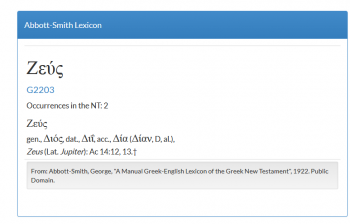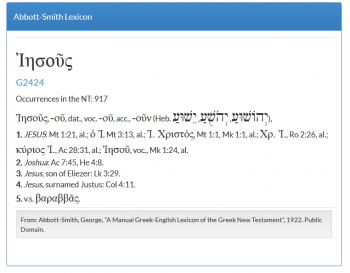"Jesus" in the Early Greek Manuscripts
Codex Sinaticus
Nomina Sacra and the Name Ἰησοῦς
by John J. Parsons
www.hebrew4christians.com
THE CODEX SINATICUS (Σιναϊτικός Κώδικας, 'the Sinai Book') is said to be the earliest complete codex (book) of the Christian Bible, though of course there are thousands of earlier extant manuscipt fragments, some of which date as early as the 1st century AD (for instance, the John Rylands Papyri dates the Gospel of John to the 1st century AD itself). Scholars say the codex was likely written in Rome sometime during the latter half of the 4th century AD. While the name "Jesus" (i.e.,
Iesous: Ἰησοῦς) does not explicitly appear in the New Testament of this codex, the "nomina sacra," or sacred abbreviation "ΙΣ"
is used throughout. Bruce Metzger's book
Manuscripts of the Greek Bible lists several of the nomina sacra found in the earliest Greek texts, including: " ΘΣ", (Θεός, God), "ΙΣ" (Jesus), "ΧΣ" (Χριστός - "Christ") "ΣΗΡ" (Savior), "ΚΣ" ( Κύριος - Lord), "ΥΣ" (Υἱός - Son), "ΣΤΣ" (Σταυρός - cross), and so on. The use of the nomina sacra for the name
Iesous therefore indicates the special status ascribed to this name by the earliest copyists...
The most important ancient targum (translation) of the
Torah is the
"Translation of the Seventy" (also known as the Septuagint or LXX), which was originally produced by 70 Jewish translators for Greek-speaking Jews in Egypt during the 3rd-2nd centuries B.C. Although the Septuagint is useful for doing biblical research, it must be remembered that it is a
Greek translation of the Masoretic Text and therefore should
not be given linguistic priority over the original Hebrew. That being said, the LXX does provide insight about how Hebrew words and concepts were translated into Koine (common) Greek for Jews of that time.
For instance, the Septuagint uses the Greek name ᾽Ιησοῦς (pronounced yay-soos) to translate the Hebrew name "Joshua" (i.e.,
Yehoshua: יְהוֹשֻׁעַ), a name formed through the combination of YHVH (
יְהוָה) and
yasha (
יָשַׁע), meaning "YHVH saves." Later Yehoshua was shortened to "Yeshua" (
יֵשׁוּעַ), though this name, too, was also translated as ᾽Ιησοῦς in the Septuagint (
1 Chron. 24:11; Neh. 8:17). Similarly, the Septuagint used the word "christos" (χριστός) for the Hebrew term "mashiach" or "the anointed" (
הַמָּשִׁיחַ).

Some people attempt to impugn the name "Jesus" by claiming that it is of
pagan origin. For example, some claim that Greek name
Iesous is derived from the name "Zeus" (Ζεύς), even though it is clear that "Zeus" comes from an ancient Phoenician god named
Baal Tzephon (
בַּעַל צְפן, i.e., "Beelzebub"). Others want to say that "Jesus" should be rendered as "YAHushua" or "YAHoshua" (or some variant thereof), appending YAH (
יָהּ) as part of the name, regardless of the fact that this is not attested to by any historical Hebrew usage. Contrary to this, it is clear that the original writers of the New Testament transliterated the Hebrew name
Yeshua (
ישוע) as Ἰησοῦς [Iēsous], in agreement with the LXX's earlier usage. Indeed many of the early "church fathers" used the name
Iesous (Ιησους) to refer to the Messiah. For instance Polycarp (70-155), Clement (c 96-110), Ignatius of Antioch (c 110 AD), and Justin Martyr (c. 100–165) all wrote in Koine Greek and plainly used the name "Iesous" to refer to the Savior. Moreover the
Didache (Διδαχὴ), dating from the first century AD, uses the name as well. For example: "First, concerning the cup: We thank thee, our Father, for the holy vine of David Thy servant, which Thou madest known to us through Jesus Thy Servant (᾽Ιησοῦ τοῦ παιδός σου); to Thee be the glory for ever (Did. 9:2).
The fact that the Greek name for "Jesus" does not explicitly appear in the Codex Sinaticus should not cause alarm to those who understand the facts about textual transmission and the practices of the scribal arts. The ancient New Testament copyists and scribes used the
nomina sacra "ΙΣ" to abbreviate and refer to ΙΗΣΟΥΣ (i.e., Iesous, i.e., "Jesus"), thereby ascribing special sanctity to that name... Regarding the name YAHshua, on the other hand, there is simply no manuscript evidence whatsoever, nor is there any linguistic connection between
Yehoshua and YAH. Beware of those people who attempt to "correct" the Name of the Savior through spurious reasoning and appeals to vanity,
chaverim....
Source: "Jesus" in the early Greek Manuscripts





